Module 5 My school day Unit 2.We start work at nine o’clock.教学课件
文档属性
| 名称 | Module 5 My school day Unit 2.We start work at nine o’clock.教学课件 | 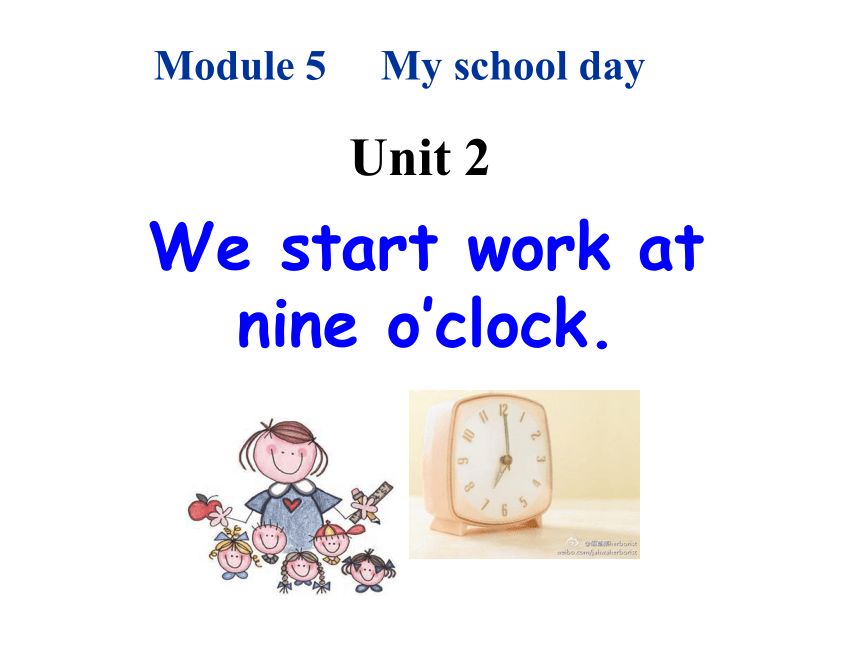 | |
| 格式 | zip | ||
| 文件大小 | 8.9MB | ||
| 资源类型 | 教案 | ||
| 版本资源 | 外研版 | ||
| 科目 | 英语 | ||
| 更新时间 | 2015-02-01 16:42:39 | ||
图片预览

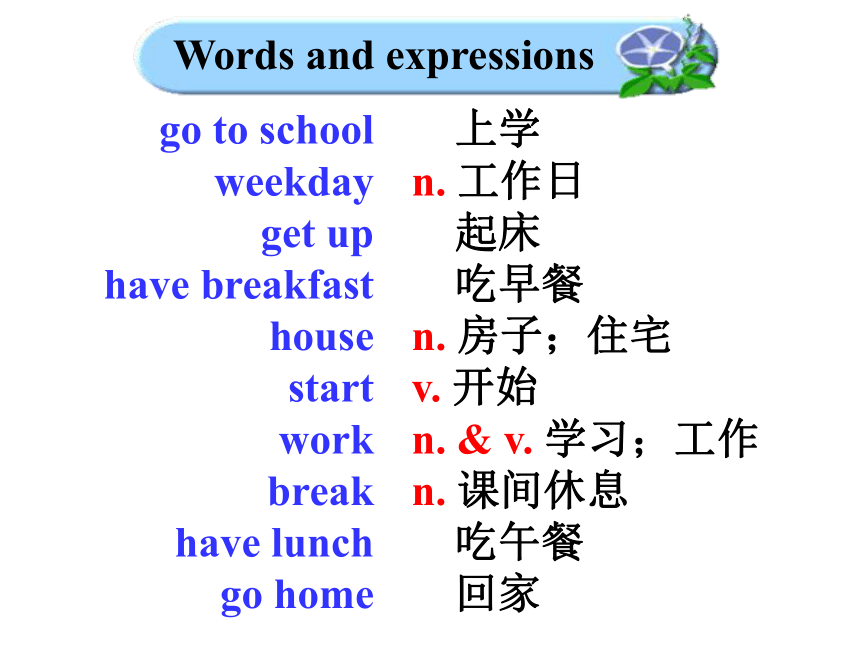
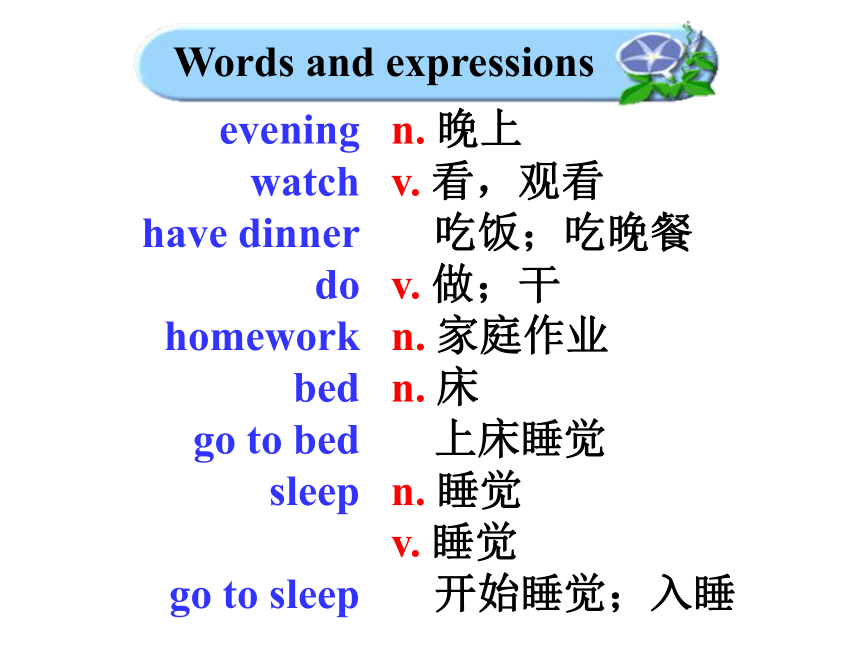
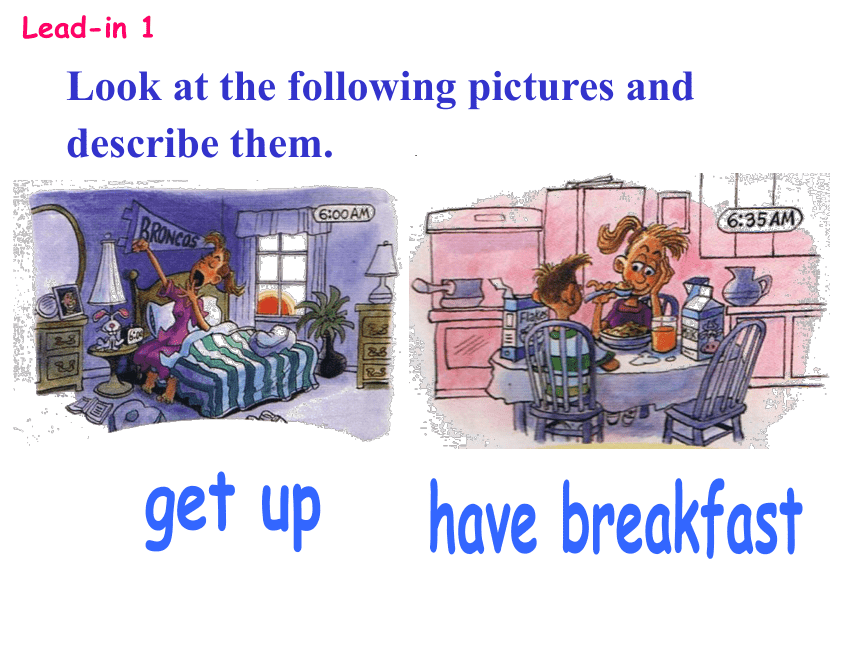

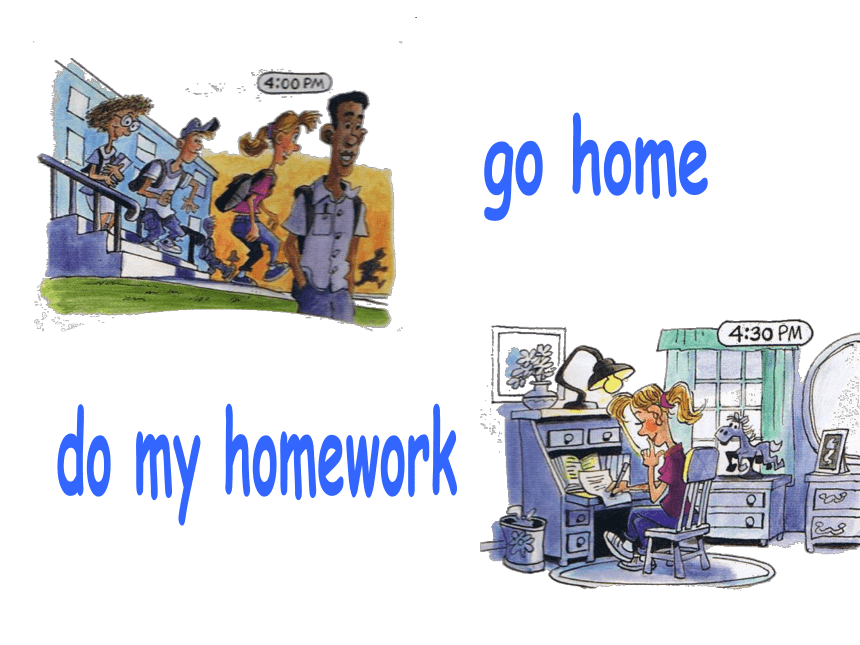

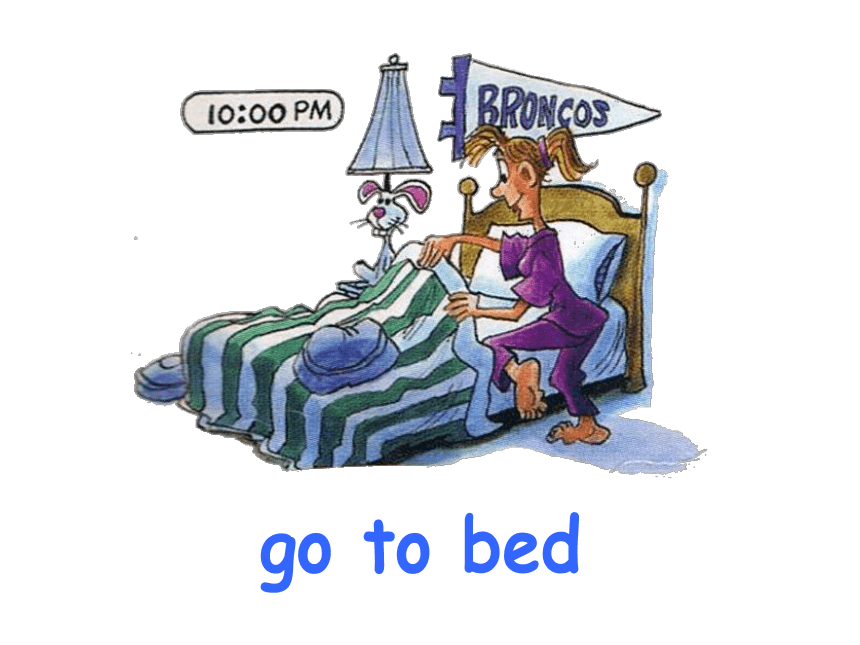
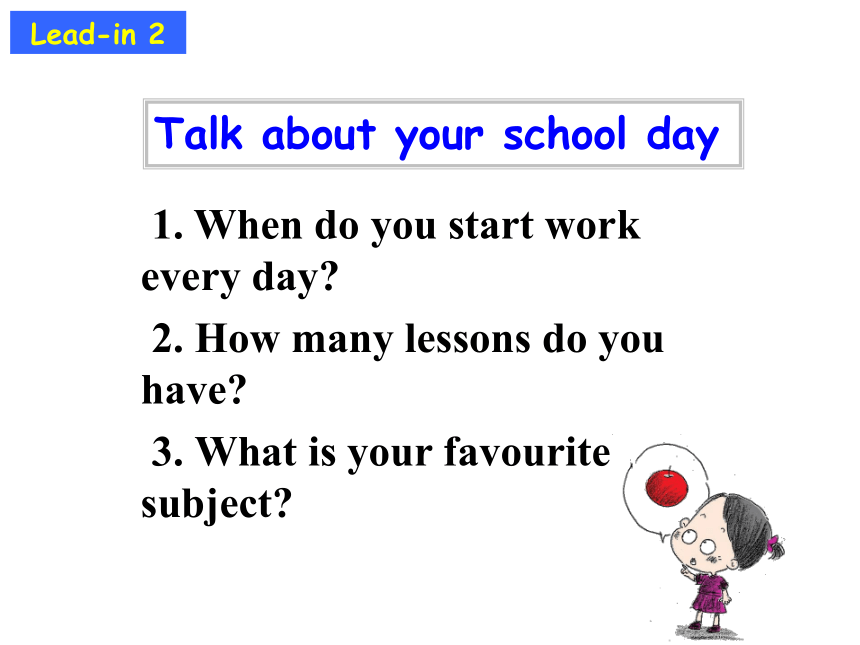

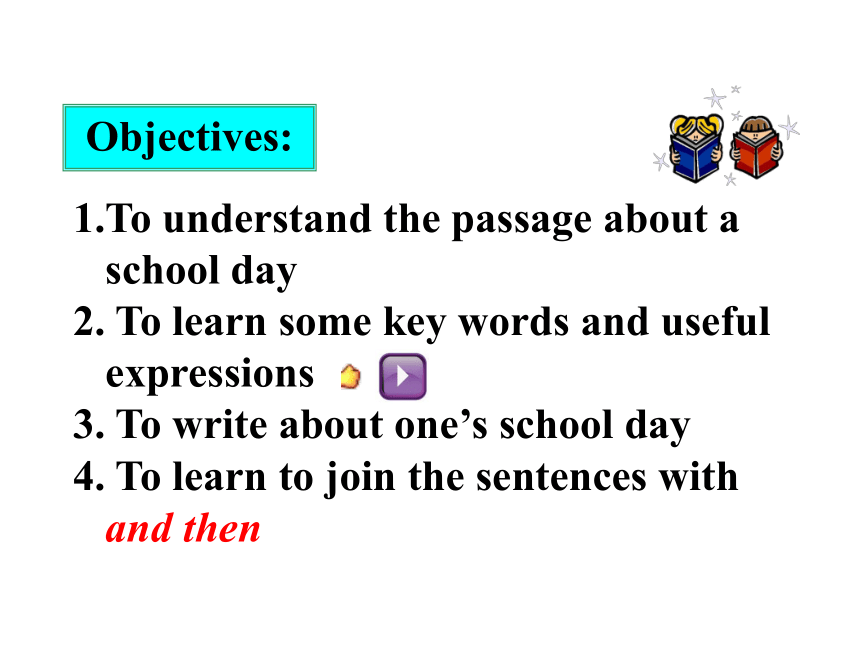
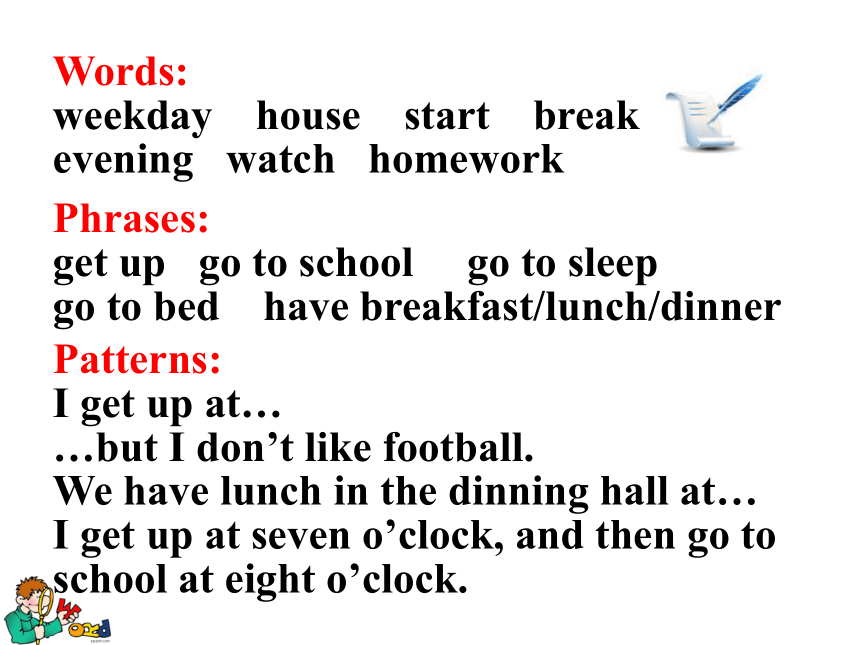
文档简介
课件40张PPT。Unit 2Module 5 My school dayWe start work at nine o’clock.go to school
weekday
get up
have breakfast
house
start
work
break
have lunch
go home 上学
n. 工作日
起床
吃早餐
n. 房子;住宅
v. 开始
n. & v. 学习;工作
n. 课间休息
吃午餐
回家Words and expressionsevening
watch
have dinner
do
homework
bed
go to bed
sleep
go to sleepn. 晚上
v. 看,观看
吃饭;吃晚餐
v. 做;干
n. 家庭作业
n. 床
上床睡觉
n. 睡觉
v. 睡觉
开始睡觉;入睡Words and expressionsLook at the following pictures and describe them.get uphave breakfastLead-in 1have lunchgo to schoolgo homedo my homeworkwatch TVhave dinnergo to bed1. When do you start work every day?
2.?How many lessons do you have?
3.?What is your favourite subject?Talk about your school dayLead-in 2Do you have any idea about how American students spend their school day?
Now enjoy a piece of video about it.To understand the passage about a school day
2. To learn some key words and useful expressions
3. To write about one’s school day
4. To learn to join the sentences with and thenObjectives:Words:
weekday house start break evening watch homework Phrases:
get up go to school go to sleep
go to bed have breakfast/lunch/dinner Patterns:
I get up at…
…but I don’t like football.
We have lunch in the dinning hall at…
I get up at seven o’clock, and then go to school at eight o’clock.Look at the pictures below and try to describe them. have lunch go to bed go home play football have breakfast have classesWhen skimming, we read the passage very quickly. We don’t need to read every word, or stop to look up words we don’t understand; we just need to get a general idea about the passage.SkimmingRead the passage quickly and put the pictures in order. 1P28When scanning, we move our eyes very quickly across the passage. We don’t need to read every word, or stop to look up words we don’t know; we just need to find the certain information we are looking for.Scanning7:30 ameRead the passage and underline the times. Then match the times with the pictures in Activity 1.210:00 pm12:30 pm3:30 pm11:00 am9:00 amcdabfRead out the times.P29Underline the correct expressions.31. I get up / start work at half past seven.
2. We have a break / have lunch at half past twelve.
3. I go home / watch TV in the evening.
4. I do my homework / see my friends in the evening.
5. I go home / go to sleep at ten o’clock.P29Read carefully and complete the table in groups.9:003:30go to schoolhave a breakhave lunchlessons startgo to bed and eveningin the
afternoon7:308:3011:0012:301:3010:00get upstart workgo homeLanguage points1. I go to school on weekdays…
周一到周五我要上学。“go to +地点名词”表示“去…… ”。如:The little boy wants to go to school now.go home意为“回家”, home在此是副
词,前面不能加to。如:Let’s go home after school.完成句子。
我早上七点钟去上学,下午五点钟回家。
I __________ at 7:00 am, and I ________ at 5:00 pm.Practise go to school go home2. I get up at half past seven in the morning and have breakfast.
我早上7点半起床,然后吃早餐。have是英语中常见的一个动词,和不同的词搭配有不同的意思。
1. My father has (got) a computer. →表示“有”
2. I have lunch at 12:00. →表示“吃”
3. Have some coffee, please. →表示“喝”4. We don’t have any lessons on Sunday. →表示“上课”
5. On Saturday, I have a busy day. →表示“度过”完成句子。
1. 我有一本新词典。
I ________ ________ a new dictionary.
2. 我们上午上四节课。
We ______ ______ ______ in the morning.
3. 他早上七点吃早餐。
He _____ _______ at seven in the morning.Practise have got have four lessons has breakfast3. We start work at nine o’clock.
我们九点开始上课。start work 意为“开始学习/工作”。work在此用作不可数名词,其前不能直接用不定冠词a修饰,其后也不能加s。work还可作动词,意为“工作,学习”。如:I have a lot of work to do. (名词)
We work hard. (动词)4. I do my homework…
我做作业。do one’s homework 意为“做作业”,其中one’s意为“某人的”,在使用时要改成与主语一致的形容词性物主代词形式。选择填空。
We do _____ homework at seven o’clock.
A. my B. his C. her D. ourPractiseI’m Alex Greenall. I go to Park School in Oxford. On my ______ _______, I get up at half past seven in the morning. I go to school at half past eight and we ______ ______ at nine o’clock. We have three lessons ______ _______ ________. At eleven o’clock, we _____ _____ ______ in the playground. We often play football there. We have lunch _____ ______ _______ ______. Our lessons _______ at half past one and finish at half past three. In the evening, I do my _________. Sometimes I watch TV before I _____ _____ ______. school day start work in the morning have a break in the dining hallhomework go to bed startFill in the blanks and retell the passage.WritingWrite about yourself. Use the expressions in Activity 3 to help you.4P29I get up at…Possible answersI get up at half past seven.
We have lunch at half past twelve.
I watch TV in the evening.
…get up
have breakfast
go to school
have three lessons
have a break
talk to my friends
go to the playground
play football起床
吃早餐
去上学
上三节课
课间休息
和我的朋友交谈
去操场
踢足球以下是一些可能用到的动词短语:have lunch
have rice
drink water
go home
watch TV
have dinner
do my homework
go to bed
in the morning
in the afternoon
in the evening吃午饭
吃米饭
喝水
回家
看电视
吃晚饭
做作业
睡觉
在早晨/上午
在下午
在晚上Work in pairs. Talk about your school day. 5A: What time do you get up everyday?
B: I get up at half past seven.
A: What time do you start work?
B: We start work at nine o’clock.
A: What time do you have lunch?
B: We have lunch at half past twelve.P29TalkLook at the sentences. 6P29I go to school
at eight o’clock.I get up at seven o’clock, and then go to school at eight o’clock.I get up at seven o’clock.Now join these sentences with and then.1. In the morning, we get up. We go to
school.
2. In the afternoon, we have lessons. We play football in the playground.
3. In the evening, I have dinner. I do my homework.
4. In the evening, I do my homework. I go to bed.In the morning, we get up and then go to school.In the afternoon, we have lessons and then play football in the playground.In the evening, I have dinner and then do my homework.In the evening, I do my homework and then go to bed.1. get up
2. have breakfast/lunch/dinner
3. have a break
4. go to bed/sleep
5. I start work at nine o’clock.
6. I get up at seven o’clock, and then go to school at eight o’clock.本课时主要短语和句型 总结回顾Now 2 mins to test your spelling.Spelling Bee1. English-Chinese
evening weekday homework sleep break
2. Chinese-English
吃午饭 入睡 开始 上学 房子 看,观看 起床 回家When finished, exchange your papers to see who does the best.注: word 文档
点击此处链接QuizⅠ. 根据句意及提示完成下列句子。
1. Mr Black has got a big ______ (房子).
2. There are some books on my ________ (床).
3. What do you do in the ________ (晚上)?
4. We start w________ at 8:00 every morning.
5. —What time do you have l________?
—At twelve o’clock.housebedeveningorkunchⅡ. 用适当的介词填空。
1. The students go to school ________
weekdays.
2. _______ the morning, I have three
lessons.
3. There are a lot of students ________ the
dining hall.
4. We play football ________ fifteen to
four.
5. I don’t like rice ________ vegetables.onIn inatwithⅢ. 用方框中所给短语完成下列句子。
get up, have dinner, watch TV,
in the playground, talk to
1. I often ___________ my friends about my trouble (苦恼).
2. Lucy and her sister __________ at 6:30
every morning.
3. Tom, you can play football with your
friends _______________ now.
4. My grandparents ____________ at home in the evening.
5. They sometimes (有时候) ___________ in
a hotel. talk to get up in the playground watch TV have dinnerⅣ. 根据汉语意思完成下列句子。
1. 我早晨7点吃早餐。
I ________________________ at seven
o’clock in the morning.
2. 李丽,你几点钟回家?
Li Li, what time do you ________________?
3. 我在家做家庭作业。
I ________________________ at home.
4. 我很累,想睡觉。
I’m very tired and I want to ______________.
5. 下课了,让我们休息一下。
Class is over and let’s __________________. have breakfast go home do my homework go to sleep have a break1. Write a short passage about your school day. (about 50 words)
2. Read the articles in Learning English.Preview1. Preview the use of present
simple tense and prepositions of time.
2. Preview the new words and expressions in Unit 3.
weekday
get up
have breakfast
house
start
work
break
have lunch
go home 上学
n. 工作日
起床
吃早餐
n. 房子;住宅
v. 开始
n. & v. 学习;工作
n. 课间休息
吃午餐
回家Words and expressionsevening
watch
have dinner
do
homework
bed
go to bed
sleep
go to sleepn. 晚上
v. 看,观看
吃饭;吃晚餐
v. 做;干
n. 家庭作业
n. 床
上床睡觉
n. 睡觉
v. 睡觉
开始睡觉;入睡Words and expressionsLook at the following pictures and describe them.get uphave breakfastLead-in 1have lunchgo to schoolgo homedo my homeworkwatch TVhave dinnergo to bed1. When do you start work every day?
2.?How many lessons do you have?
3.?What is your favourite subject?Talk about your school dayLead-in 2Do you have any idea about how American students spend their school day?
Now enjoy a piece of video about it.To understand the passage about a school day
2. To learn some key words and useful expressions
3. To write about one’s school day
4. To learn to join the sentences with and thenObjectives:Words:
weekday house start break evening watch homework Phrases:
get up go to school go to sleep
go to bed have breakfast/lunch/dinner Patterns:
I get up at…
…but I don’t like football.
We have lunch in the dinning hall at…
I get up at seven o’clock, and then go to school at eight o’clock.Look at the pictures below and try to describe them. have lunch go to bed go home play football have breakfast have classesWhen skimming, we read the passage very quickly. We don’t need to read every word, or stop to look up words we don’t understand; we just need to get a general idea about the passage.SkimmingRead the passage quickly and put the pictures in order. 1P28When scanning, we move our eyes very quickly across the passage. We don’t need to read every word, or stop to look up words we don’t know; we just need to find the certain information we are looking for.Scanning7:30 ameRead the passage and underline the times. Then match the times with the pictures in Activity 1.210:00 pm12:30 pm3:30 pm11:00 am9:00 amcdabfRead out the times.P29Underline the correct expressions.31. I get up / start work at half past seven.
2. We have a break / have lunch at half past twelve.
3. I go home / watch TV in the evening.
4. I do my homework / see my friends in the evening.
5. I go home / go to sleep at ten o’clock.P29Read carefully and complete the table in groups.9:003:30go to schoolhave a breakhave lunchlessons startgo to bed and eveningin the
afternoon7:308:3011:0012:301:3010:00get upstart workgo homeLanguage points1. I go to school on weekdays…
周一到周五我要上学。“go to +地点名词”表示“去…… ”。如:The little boy wants to go to school now.go home意为“回家”, home在此是副
词,前面不能加to。如:Let’s go home after school.完成句子。
我早上七点钟去上学,下午五点钟回家。
I __________ at 7:00 am, and I ________ at 5:00 pm.Practise go to school go home2. I get up at half past seven in the morning and have breakfast.
我早上7点半起床,然后吃早餐。have是英语中常见的一个动词,和不同的词搭配有不同的意思。
1. My father has (got) a computer. →表示“有”
2. I have lunch at 12:00. →表示“吃”
3. Have some coffee, please. →表示“喝”4. We don’t have any lessons on Sunday. →表示“上课”
5. On Saturday, I have a busy day. →表示“度过”完成句子。
1. 我有一本新词典。
I ________ ________ a new dictionary.
2. 我们上午上四节课。
We ______ ______ ______ in the morning.
3. 他早上七点吃早餐。
He _____ _______ at seven in the morning.Practise have got have four lessons has breakfast3. We start work at nine o’clock.
我们九点开始上课。start work 意为“开始学习/工作”。work在此用作不可数名词,其前不能直接用不定冠词a修饰,其后也不能加s。work还可作动词,意为“工作,学习”。如:I have a lot of work to do. (名词)
We work hard. (动词)4. I do my homework…
我做作业。do one’s homework 意为“做作业”,其中one’s意为“某人的”,在使用时要改成与主语一致的形容词性物主代词形式。选择填空。
We do _____ homework at seven o’clock.
A. my B. his C. her D. ourPractiseI’m Alex Greenall. I go to Park School in Oxford. On my ______ _______, I get up at half past seven in the morning. I go to school at half past eight and we ______ ______ at nine o’clock. We have three lessons ______ _______ ________. At eleven o’clock, we _____ _____ ______ in the playground. We often play football there. We have lunch _____ ______ _______ ______. Our lessons _______ at half past one and finish at half past three. In the evening, I do my _________. Sometimes I watch TV before I _____ _____ ______. school day start work in the morning have a break in the dining hallhomework go to bed startFill in the blanks and retell the passage.WritingWrite about yourself. Use the expressions in Activity 3 to help you.4P29I get up at…Possible answersI get up at half past seven.
We have lunch at half past twelve.
I watch TV in the evening.
…get up
have breakfast
go to school
have three lessons
have a break
talk to my friends
go to the playground
play football起床
吃早餐
去上学
上三节课
课间休息
和我的朋友交谈
去操场
踢足球以下是一些可能用到的动词短语:have lunch
have rice
drink water
go home
watch TV
have dinner
do my homework
go to bed
in the morning
in the afternoon
in the evening吃午饭
吃米饭
喝水
回家
看电视
吃晚饭
做作业
睡觉
在早晨/上午
在下午
在晚上Work in pairs. Talk about your school day. 5A: What time do you get up everyday?
B: I get up at half past seven.
A: What time do you start work?
B: We start work at nine o’clock.
A: What time do you have lunch?
B: We have lunch at half past twelve.P29TalkLook at the sentences. 6P29I go to school
at eight o’clock.I get up at seven o’clock, and then go to school at eight o’clock.I get up at seven o’clock.Now join these sentences with and then.1. In the morning, we get up. We go to
school.
2. In the afternoon, we have lessons. We play football in the playground.
3. In the evening, I have dinner. I do my homework.
4. In the evening, I do my homework. I go to bed.In the morning, we get up and then go to school.In the afternoon, we have lessons and then play football in the playground.In the evening, I have dinner and then do my homework.In the evening, I do my homework and then go to bed.1. get up
2. have breakfast/lunch/dinner
3. have a break
4. go to bed/sleep
5. I start work at nine o’clock.
6. I get up at seven o’clock, and then go to school at eight o’clock.本课时主要短语和句型 总结回顾Now 2 mins to test your spelling.Spelling Bee1. English-Chinese
evening weekday homework sleep break
2. Chinese-English
吃午饭 入睡 开始 上学 房子 看,观看 起床 回家When finished, exchange your papers to see who does the best.注: word 文档
点击此处链接QuizⅠ. 根据句意及提示完成下列句子。
1. Mr Black has got a big ______ (房子).
2. There are some books on my ________ (床).
3. What do you do in the ________ (晚上)?
4. We start w________ at 8:00 every morning.
5. —What time do you have l________?
—At twelve o’clock.housebedeveningorkunchⅡ. 用适当的介词填空。
1. The students go to school ________
weekdays.
2. _______ the morning, I have three
lessons.
3. There are a lot of students ________ the
dining hall.
4. We play football ________ fifteen to
four.
5. I don’t like rice ________ vegetables.onIn inatwithⅢ. 用方框中所给短语完成下列句子。
get up, have dinner, watch TV,
in the playground, talk to
1. I often ___________ my friends about my trouble (苦恼).
2. Lucy and her sister __________ at 6:30
every morning.
3. Tom, you can play football with your
friends _______________ now.
4. My grandparents ____________ at home in the evening.
5. They sometimes (有时候) ___________ in
a hotel. talk to get up in the playground watch TV have dinnerⅣ. 根据汉语意思完成下列句子。
1. 我早晨7点吃早餐。
I ________________________ at seven
o’clock in the morning.
2. 李丽,你几点钟回家?
Li Li, what time do you ________________?
3. 我在家做家庭作业。
I ________________________ at home.
4. 我很累,想睡觉。
I’m very tired and I want to ______________.
5. 下课了,让我们休息一下。
Class is over and let’s __________________. have breakfast go home do my homework go to sleep have a break1. Write a short passage about your school day. (about 50 words)
2. Read the articles in Learning English.Preview1. Preview the use of present
simple tense and prepositions of time.
2. Preview the new words and expressions in Unit 3.
同课章节目录
- Starte
- Module 1 My teacher and my friends
- Module 2 My English lesson
- Module 3 My English book
- Module 4 My everyday life
- Module 1 My classmates
- Unit 1 Nice to meet you.
- Unit 2 I'm Wang Lingling and I'm thirteen years ol
- Unit 3 Language in use.
- Module 2 My family
- Unit 1 Is this your mum?
- Unit 2 These are my parents.
- Unit 3 Language in use.
- Module 3 My school
- Unit 1 There are thirty students in my class.
- Unit 2 The library is on the left of the playgroun
- Unit 3 Language in use.
- Module 4 Healthy food
- Unit 1 We've got lots of apples.
- Unit 2 Is your food and drink healthy?
- Unit 3 Language in use.
- Module 5 My school day
- Unit 1 I love history.
- Unit 2 We start work at nine o'clock.
- Unit 3 Language in use.
- Revision module A
- Module 6 A trip to the zoo
- Unit 1 Does it eat meat?
- Unit 2 The tiger lives in Asia.
- Unit 3 Language in use.
- Module 7 Computers
- Unit 1 How do I write my homework on the computer?
- Unit 2 When do you use a computer?
- Unit 3 Language in use.
- Module 8 Choosing presents
- Unit 1 I always like birthday parties.
- Unit 2 She often goes to concerts.
- Unit 3 Language in use.
- Module 9 People and places
- Unit 1 We're enjoying the school trip a lot.
- Unit 2 They're waiting for buses or trains.
- Unit 3 Language in use.
- Module 10 Spring Festival
- Unit 1 Are you getting ready for Spring Festival?
- Unit 2 My mother's cleaning our houses and sweepin
- Unit 3 Language in use.
- Revision module B
